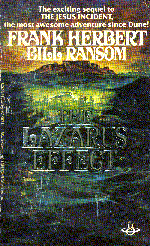|
The Lazarus Effect
Copyright 1983 by
I first read this in 1985 and most recently on the 9th January 2003 On the ocean world of Pandora, mutant humanity diversified into two groupings, the Islanders and the Mermen. The Islanders tolerate any mutation, any deformity, as long as it is not dangerous to the community. The Mermen strive for their vision of pure humanity, revolted by mutations, seeking perfection. The Islanders have adapted to the ocean life-style, going with the currents on their great living islands. Their lives are often harsh, difficult and short, there are too many deformed, maladapted people and too little space, too little food. The Mermen have rebuilt a high-tech environment beneath the sea. They struggle to restore the old Pandora, as it existed when humans first arrived. To achieve this, they must recreate the land, make islands in this wide ocean. However, both societies have adapted to a world without surface land and they may no longer be willing or able to readapt. The Mermen strive also and restore consciousness to the world-spanning Kelp, but in the early days on Pandora it was this self-aware Kelp that threatened humanity and it was humanity that destroyed it. Well, of course, Dune was so massively successful that everything else he wrote got completely ignored. Odd that. You'd expect the publishers to promote other Herbert books along with the successful ones, maybe they'd get another hit series. Still I'm not a publisher. This is the sequel to "The Jesus Incident" which apparently itself was a sequel to "Destination Void" a book about which I'd completely forgotten. The final novel in this series is "The Ascension Factor". See, here's a series that's got everything a publisher could want. Look at the title of the first book "Destination: Void". 'Destination' clearly indicates a strong sense of direction. 'Void' succinctly expresses the essential nullity of youth culture (at least the perennial adult perception of it) so this novel should be appealing to a youth audience. Additionally the sequels provide a good strong dose of orthodox religion in their titles. And hold on, those last two titles sound remarkably similar to some of Robert Ludlum's thrillers, so they'd also tap into that market. A publisher wouldn't even have to read the books to know he was onto a winner. I've been a fan of Mr Herbert since, well, in fact probably since Destination Void. I was a little slow in reading "Dune", after all it was rather thick, but good though it was I still preferred novels like the "Dosadi Experiment" and "Hellstrom's Hive". I'm a fan of his writing style with those perplexing quotations introducing the chapters and the protagonists' observations printed in italic text, just so dumbos like me wouldn't miss them. Together these mechanisms implied depths of perception that I, in my normal superficiality, simply missed. His writing always made me think that, if I just read the book more carefully, I could get so much more out of it. Indeed his writing also made me feel the same applied to life and social interaction - that there was a level of communication to which I was simply deaf and that attention to and mastery of it would give me knowledge and power. Of course, it didn't work out like that. Nowadays I pay so much attention to non-verbal queues that I lose track of the conversation. Most of the time I don't even speak, just stare voicelessly at the other person, raising my eyebrow to the twitch in their cheek. but nothing is communicated. Loaded on the 31st January 2003.
|
|






